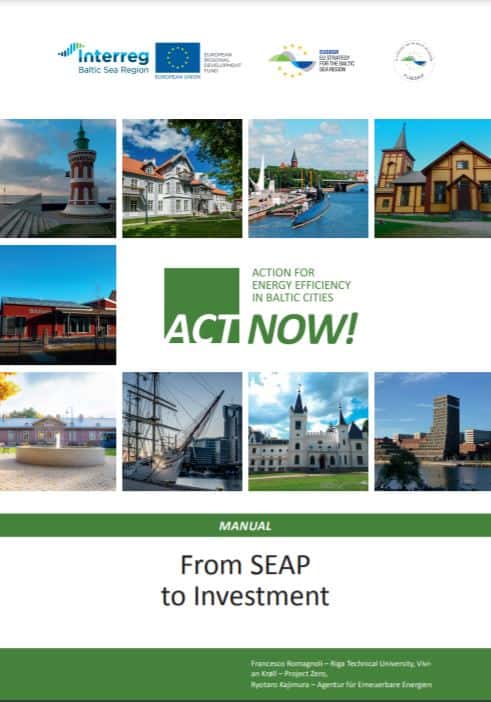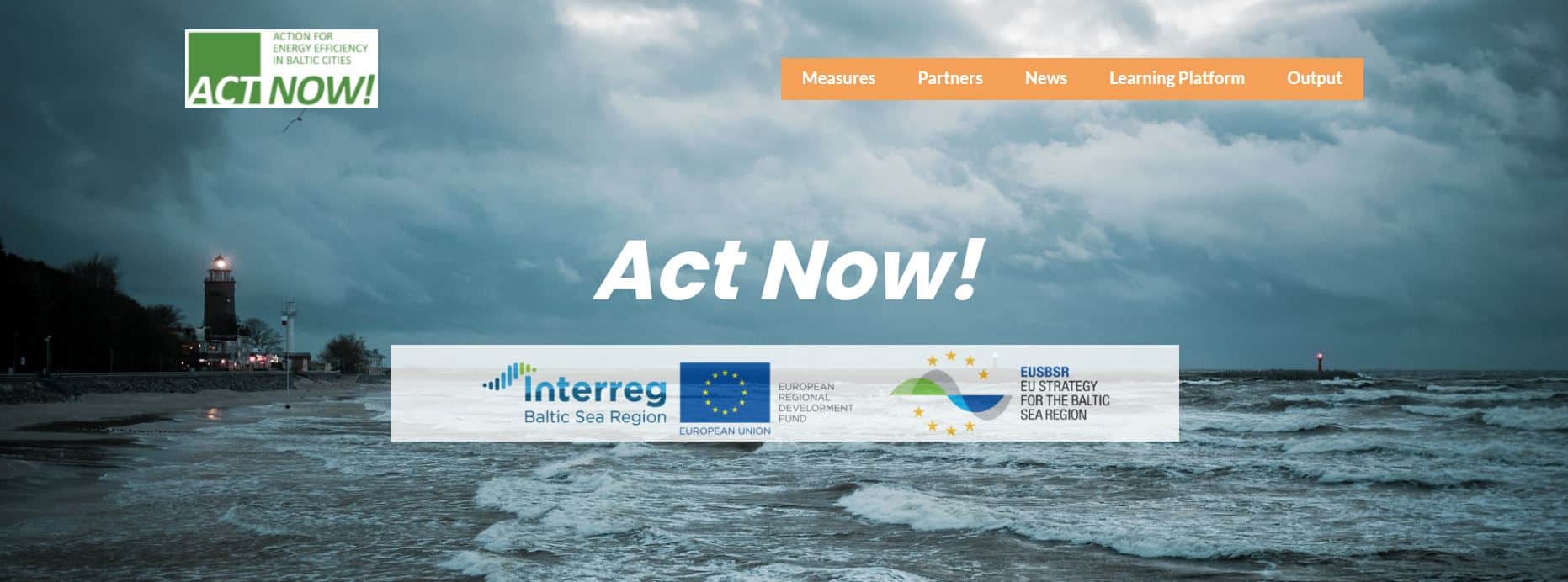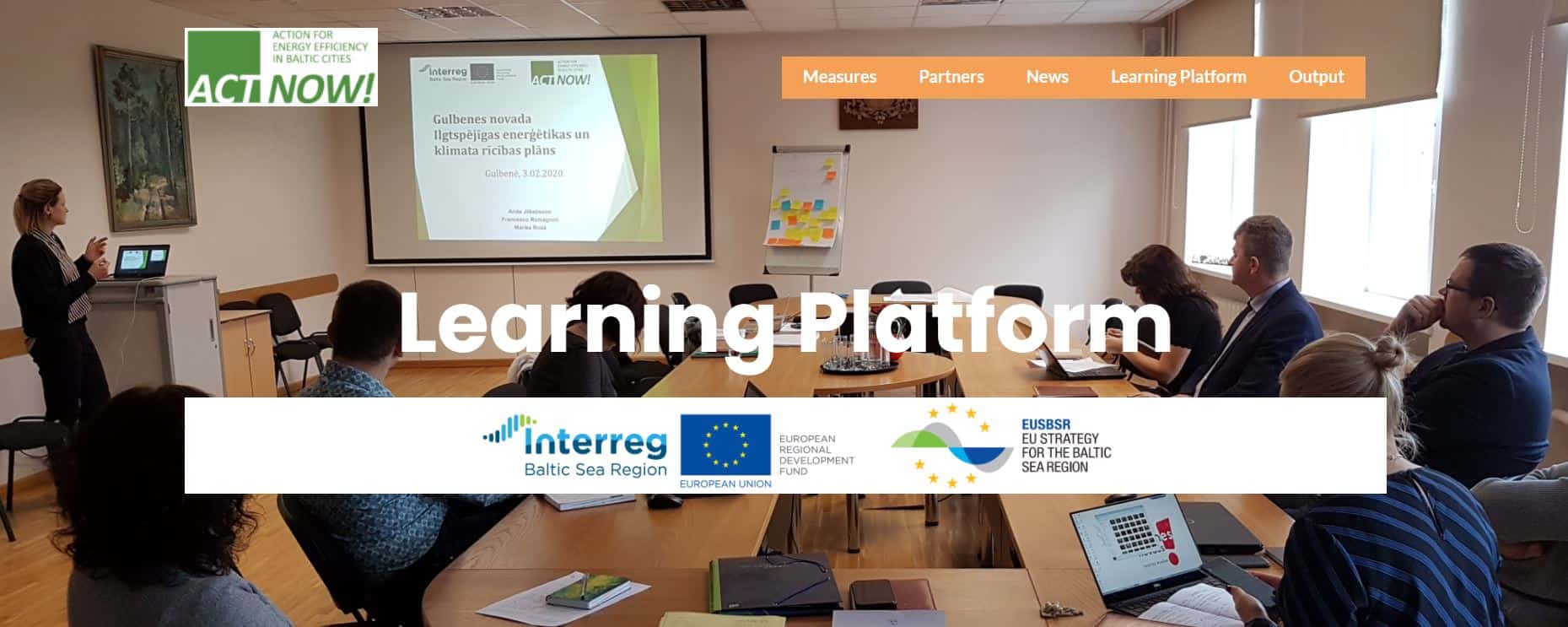Act Now
Europe’s biggest energy resource is energy efficiency. Reduction in energy consumption to heat buildings is a precondition for an increase in energy efficiency. Energy efficiency measures in the existing building stock compared to newly constructed buildings are vital for reaching the energy efficiency targets. The decentralised heat supply is highly inefficient in parallel with the extensive energy consumption caused primarily by private households. In addition, 70% of the heating installations are outdated while investments in heating systems are delayed.
Above that, insufficient resources, undeveloped structures and limited knowledge, especially vulnerable in smaller municipalities, deteriorate the situation. The existing strategic energy action plans (SEAPs) and concepts for climate protection proposed by many municipalities are still not enough.
For reaching the energy saving objectives, municipalities need a holistic approach in increasing energy efficiency as well as targeted solutions. They need new knowledge and tools to turn their SEAPs into action. Especially smaller local authorities suffer from insufficient capacities related to resources, structures and knowledge. They do not have sufficient information about the most effective measures and investments related to energy saving due to poor monitoring data and insufficient energy management systems. Smaller local authorities lack capacities to initiate and plan investments to increase energy efficiency among the involved staff of municipalities and cooperating institutions, for example housing companies and utilities.
Budgets
in numbers
-
3.58MillionTotal
-
2.75MillionErdf
-
0.10MillionEni + Russia
-
0.00MillionNorway
Achievements
Valuable tools developed
Aimed at increasing energy efficiency in municipalities, the project introduced a new approach for assessment and customisation of existing capacities in energy management. By analysing commitment and management, energy planning, implementation, available resources, infrastructure and home-owner segment, the municipalities got a better understanding of concrete gaps. Once completed, the self-assessment tool suggests what aspects in energy management and capacity building should be improved, for instance in policy, communications, human resources, monitoring or documentation.
Furthermore, a learning platform on energy efficiency in the building stock developed by the project, provided municipalities with the needed tools in enhancing capacity building. With hands-on guidance on establishing working groups and setting up the process, the platform enabled to ensure a holistic approach to gathering, accessing and applying information to tackle concrete gaps. The platform collected all the knowledge the project has developed and tested in participating municipalities. Furthermore, to inform other municipalities about the collected knowledge the partners arranged several national and reginal workshops for municipalities in nine countries across the Baltic Sea region.
Municipalities tested the new approach
Nine municipalities participating in the project, Bremerhaven (Germany), Elva (Estonia), Gdynia (Poland), Gulbene (Latvia), Kaliningrad (Russia), Mönsterås (Sweden), Sievi and Ylivieska sub-region (Finland), Šilutė (Lithuania), and Sonderborg (Denmark) succeeded in setting up local energy efficiency groups (LEEG) by involving representatives of municipalities, public organisations like schools, transport agencies as well as businesses, home owners and residents. The LEEGs enabled to coordinate and streamline knowledge scattered across different municipal departments and other organisations.
Thanks to the project, the participating municipalities started the revision of their sustainable energy action plans by including the climate dimension. In some cases, the LEEGs were expanded by involving political representatives and setting energy efficiency on the political agenda.
With EUR 3.4 million invested by the European Union, the Interreg project Act Now has strengthened capacity building in municipalities, streamlined the scattered knowledge and invested in improved monitoring. New approaches in self-assessment and monitoring have been put into practice by piloting in the participating municipalities. To continue the successful work even more investments for a minimum of seven million euros after the project ends are foreseen.
Outputs
Manual: from the sustainable energy action plan to investment

Capacity self-assessment tool for municipalities

Learning platform on energy efficiency in the building stock

Project Stories
Partners
Magistrate of the City of Bremerhaven
- TownBremerhaven
- RegionBremerhaven, Kreisfreie Stadt
- CountryGermany
- RepresentativeTill Scherzinger
- Phone
- E-Mail
- Web
Leuphana University Lüneburg
- TownLüneburg
- RegionLüneburg, Landkreis
- CountryGermany
- RepresentativeHeinrich Degenhart
- Phone
- E-Mail
- Web
Renewable Energies Agency (AEE)
- TownBerlin
- RegionBerlin
- CountryGermany
- RepresentativeRyotaro Kajimura
- Phone
- E-Mail
- Web
Energy agency for South East Sweden
- TownVäxjö
- RegionKronobergs län
- CountrySweden
- RepresentativeLena Eckerberg
- Phone
- E-Mail
- Web
Trolleybus Communication Enterprise Ltd.
- TownGdynia
- RegionGdański
- CountryPoland
- RepresentativeMikołaj Bartłomiejczyk
- Phone
- E-Mail
- Web
Centria University of Applied Sciences Ltd.
- TownKokkola
- RegionPohjois-Pohjanmaa
- CountryFinland
- RepresentativeMikko Himanka
- Phone
- E-Mail
- Web
ProjectZero
- TownSonderborg
- RegionSydjylland
- CountryDenmark
- RepresentativePeter Rathje
- Phone
- E-Mail
- Web
Municipality of Gdynia
- TownGdynia
- RegionGdański
- CountryPoland
- RepresentativeTomasz Piszczek
- Phone
- E-Mail
- Web
The Szewalski Institute of Fluid-Flow Machinery Polish Academy of Sciences
- TownGdansk
- RegionGdański
- CountryPoland
- RepresentativeAdam Cenian
- Phone
- E-Mail
- Web
Silute District Municipality Administration
- TownSilute
- RegionKlaipėdos apskritis
- CountryLithuania
- RepresentativeAlina Overlingaite
- Phone
- E-Mail
- Web
Riga Technical University
- TownRiga
- RegionRīga
- CountryLatvia
- RepresentativeFrancesco Romagnoli
- Phone
- E-Mail
- Web
Gulbene Municipality Council
- TownGulbene
- RegionVidzeme
- CountryLatvia
- RepresentativeBaiba Kalmane
- Phone
- E-Mail
- Web
Elva Municipality
- TownElva
- RegionLõuna-Eesti
- CountryEstonia
- RepresentativeTonu Muru
- Phone
- E-Mail
- Web
South-Estonian Centre of Renewable Energy (MTÜ LETEK)
- TownMärja village, Tähtvere, Tartu County
- RegionLõuna-Eesti
- CountryEstonia
- RepresentativeMari Habicht
- Phone
- E-Mail
- Web
Association of Ylivieska Region
- TownYlivieska
- RegionPohjois-Pohjanmaa
- CountryFinland
- RepresentativeTimo Kiema
- Phone
- E-Mail
- Web
CivittaUAB
- TownVilnius
- RegionVilniaus apskritis
- CountryLithuania
- RepresentativeDmitrij Sosunov
- Phone
- E-Mail
- Web
Immanuel Kant Baltic Federal University
- TownKaliningrad
- RegionKaliningrad Oblast
- Country
- RepresentativeSergey Molchanov
- Phone
- E-Mail
- Web
-
Project managerTill ScherzingerMagistrat of the City of Bremerhaven
-
Legal representativeMelf GrantzMagistrate of the City of Bremerhaven
-
Financial managerFrank WeippertMagistrat der Stadt Bremerhaven - Umweltschutzamt
-
Communication managerNikolai Resnikovecolo, Agency for Ecology and Communiation



